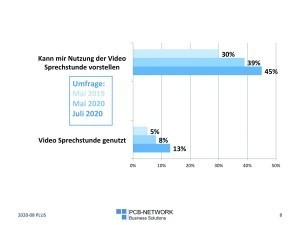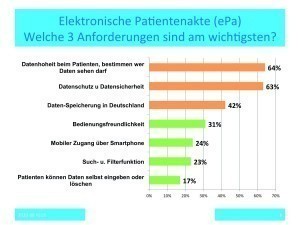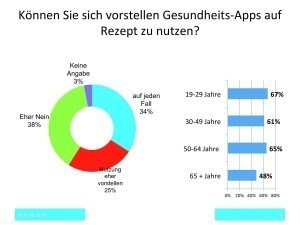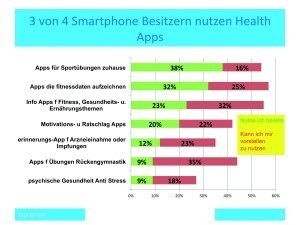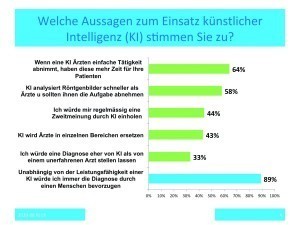Video consultations with the doctor, health apps on prescription, electronic patient files, e-prescriptions, artificial intelligence for evaluating CT or X-ray images - these are just some of the areas that will go 'live' in the near future. From this fall, doctors in Germany will be able to prescribe health apps for smartphones for the first time. This will be followed by the introduction of electronic patient files at the beginning of 2021, and e-prescriptions will become mandatory in 2022.
As part of a survey, the industry association bitkom asked about acceptance and opinions on the topic of digital health: 65% of 1193 German citizens surveyed believe that digital services will make patients more educated and informed. 63% believe that doctors and medical staff are relieved and can spend more time with patients.
Video consultation hours
The coronavirus pandemic has accelerated the issue, as Figure 1 shows: One in eight (13%) has already attended a video consultation with a doctor or therapist. This applies to women (16%) almost twice as often as men (9%). Those who have been to a video consultation want to go again: 12% say they want to use a video consultation again in the future, only 1% do not. If a video consultation is used, it is almost exclusively with a doctor they already know (97%). The rest book a visit with a previously unknown doctor via an online platform. The online doctor visit was generally experienced positively by the participants: 87% rated their experience as good or very good. For many, the coronavirus was the decisive factor in using a video consultation: 85% are worried about becoming infected with Covid-19 in the doctor's surgery(Fig. 2). 41% are afraid of catching another disease in the waiting room. More than one in two (54%) state that they want to get medical advice as quickly as possible, while other reasons include avoiding waiting times (38%), convenience (35%) and one in four (26%): Curiosity. The coronavirus crisis has shown how easy it is to reduce bureaucratic requirements: Doctors and therapists do not currently have to submit a complicated application for video consultations; a simple notification to the responsible body is sufficient. This has proven itself in practice.
Even those who have only been to the practice in person so far are very open to digital services: Almost one in two (45%) can imagine attending a video consultation in the future. However, 38% rule this out for themselves. In this group, the majority prefer a face-to-face consultation (84%) or are concerned about a misdiagnosis (75%) if they only meet online. One in five of those who reject video consultations (21%) do not have the necessary technical equipment.
Apps on prescription
Whether it's a diabetes diary, back exercises at home or eye training - people are very open to health apps prescribed by their doctor(Fig. 3). The first apps of this kind will be available in Germany from fall 2020 and will be covered by statutory health insurance. Almost 6 out of 10 respondents (59%) can well imagine using such an app. Even among the over-65s, almost one in two (48%) said they would. 4 out of 10 patients (40%) even want to actively ask their doctor for an app on prescription and almost one in three (30%) believe that there will be cases in which apps replace conventional therapies in the future.
Smartphone users are already very well versed when it comes to health, fitness or nutrition apps: three quarters (75%) have installed at least one freely available app, including apps with sports exercises for at home (38%), apps that record fitness data such as steps or heart rate (32%) or apps with information on fitness, health or nutrition topics (23%). Most users benefit from these apps by knowing more about their own health (63%), exercising more (54%) or eating more healthily (47%). 39% even organize their lives according to the vital data they receive via the app. However, the experience of using them is not always positive: almost one in five (18%) say they feel pressured by their health apps(Fig. 4).
Electronic patient file
Health Minister Spahn said in a presentation that he had voted in favor of electronic patient records 17 years ago when he was a young member of parliament. At that time, he believed that the ePa would be available in 1 year. Unfortunately, it had taken 15 years to develop an egg-laying wool-milk sow. This is now a thing of the past. He wants an app on the smartphone for which the user himself is responsible for who the data is shared with. The aim is to find a quick solution that can be readjusted after 1 to 2 years if necessary, instead of wasting a lot of time again.
The electronic patient record (ePa) will be introduced on January 1, 2021 and is expected to meet with great interest: 73% would use the ePa. The issue of data is particularly important to those who can imagine using it: for 64%, it is essential that data sovereignty lies with the insured person and that only the patient determines which doctor is allowed to see which data. Almost as many (63%) cite data protection and data security as the most important issues overall. Ease of use is particularly important to almost one in three (31%), while one in four (24%) would like mobile access via smartphone. The electronic patient file is at the heart of the digitalization of the healthcare system. It gives insured persons quick access to their medical data, their diagnoses or their vaccination record(Fig. 5).
E-prescription
Electronic prescriptions will also be introduced in Germany in 2021, which can then be filled via a smartphone app at the pharmacy of choice. Two thirds (66%) can imagine using it. The figure is 70% for 16 to 29-year-olds, 64% for 30 to 49-year-olds, 69% for 50 to 64-year-olds and 62% for the over 65s.
Artificial intelligence
Evaluating X-ray and CT images, identifying tumors, adapting cancer therapies individually: Artificial intelligence (AI) has enormous potential in medicine. A growing number of patients also share this insight: 44% say they would regularly seek a second opinion from an artificial intelligence system in future - compared to 31% in 2019. 45% even believe that doctors should always have their diagnosis checked by an AI (2019: 39%). Overall, many people see AI primarily as effective support: 64% believe that doctors have more time for their patients if artificial intelligence takes over simple tasks. 58% say that computer programs with artificial intelligence analyze X-ray images faster than doctors and should permanently relieve them of this task. AI can relieve doctors of routine tasks - and provide improved diagnoses with the help of big data(Fig. 6).
In a nutshell:
- Corona has significantly accelerated Digtal Health. While only 5% of patients used video consultations in 2019, this figure almost tripled to 13% 15 months later in July 2020.
- 91% would recommend the use of a video consultation to friends or family 80% would like the range of video consultations to be expanded.
- 59% would use a health app prescribed by a doctor, ranging from fitness data and sports exercises to reminders to take medication or get vaccinations.
- 73% of respondents would use an electronic patient record, but on the condition that they have data sovereignty, data protection is guaranteed and the data is stored in Germany.
- The use of artificial intelligence (AI) is viewed positively, especially for second medical opinions, relieving doctors of routine tasks and, for example, for evaluating CT or X-ray images.
Germany is lagging behind many industrialized countries when it comes to the digitalization of the healthcare system. For example, implant registers are only now being set up so that product defects can be identified and stopped more quickly. Networking in the healthcare sector also still seems a bit pretentious when you look at the number of faxes that are exchanged every day. There is still a lot to do here. We can only hope that Health Minister Jens Spahn will remain in office for a few more years and continue with the same drive.
Stay healthy and lively
Best regards from
Hans-Joachim Friedrichkeit


